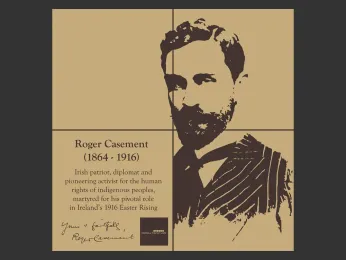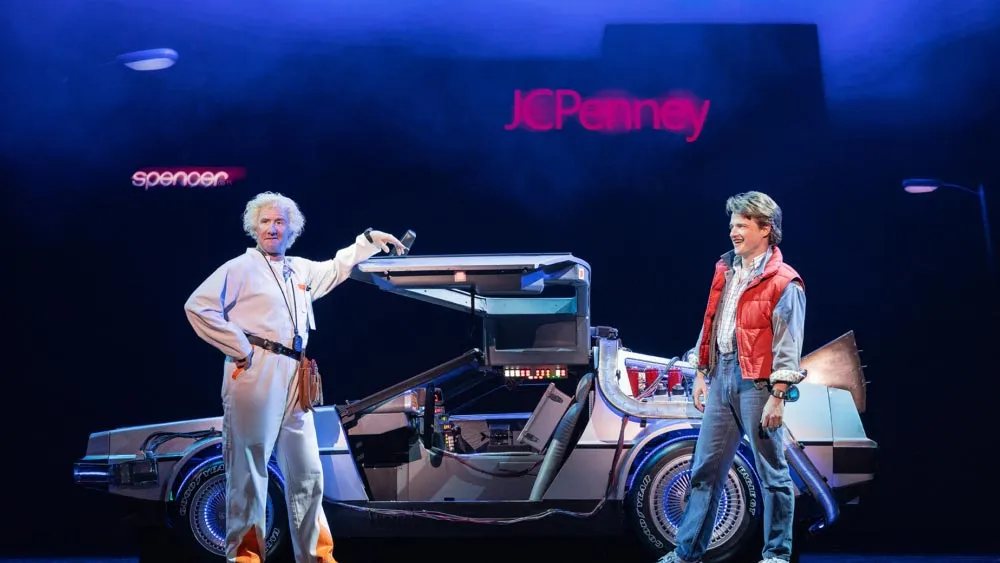
Aug 6
SF nonprofit looks to add LGBTQ luminaries’ plaques to Castro streets
Cynthia Laird READ TIME: 8 MIN.
Organizers of the Rainbow Honor Walk in San Francisco’s Castro neighborhood are gearing up to add several plaques amid changes to the project that posthumously honors LGBTQ luminaries. The board of the nonprofit may also alter how it selects people in the future in an effort to get the plaques installed quicker.
The last formal class of 23 inductees was announced in 2022. The plaques for three of those people, including gay Bay Area Reporter founding publisher Bob Ross, are expected to be installed soon. A plaque for Roger Casement, a gay Irishman who was hanged for treason in 1916, is expected to be installed in October, according to Charlotte Ruffner, vice president of the honor walk board, and Matthew Rothschild, a gay man and retired attorney who has taken the lead in fundraising for the Casement plaque.
The other plaques from the 2022 class that are expected to be installed will honor trans activist Marsha P. Johnson and gay activist Gilbert Baker, who co-created the rainbow flag. In 2021, the all-volunteer honor walk board selected lesbian trailblazer Phyllis Lyon, who died in 2020, to have a plaque. Lyon’s spouse, the late Del Martin, was inducted into the honor walk in the first class in 2014 and her plaque can be found on 19th Street near Collingwood Street.
“The plaques for Phyllis Lyon, Bob Ross, Marsha P. Johnson, and Gilbert Baker were all received from the foundry in May,” Ruffner wrote in an email. “I’m happy to report they’ve all been paid for in full and are ready to be installed. As Donna Sachet mentioned, we’re now navigating the city’s permit process and finalizing the selection of a contractor. Once that’s in place, we’ll coordinate the installation.”
Sachet, a former Imperial Court empress and longtime San Francisco resident, has served as the president of the honor walk board for six years, though she is expected to step down from the role in September. Right now, Sachet wrote in an email, she is working with San Francisco Public Works to coordinate permits and other issues related to the installation of the plaques.
Last year, in addition to Casement, the board approved a plaque for Mario Mieli, a gay man considered a founder of Italy’s homosexual movement and one of the leading theoreticians in Italian homosexual activism. Mieli died in 1983 at age 30.
“For clarification, the Mieli and Casement plaques have not been fabricated. We have not paid them,” Ruffner stated. “The Mieli plaque has been ordered, but we don’t yet have a delivery date. If it arrives in time, we’ll aim to install it with the others.”
The Casement plaque is hoped to be installed in early October, Rothschild told the B.A.R. in a phone interview.
Ruffner told the B.A.R. it is likely the new plaques will be installed along 18th Street.
According to Ruffner, there are currently 44 plaques installed in the Castro as part of the Rainbow Honor Walk project. A map of the locations is on the honor walk’s website.
Leadership changes expected
Ruffner, a straight ally, could become the honor walk’s next board president. She told the B.A.R. in a phone interview that she would like to see the plaque selection process changed.
“I have agreed to step up when Donna steps down,” Ruffner said.
“We only meet once a month,” Ruffner continued. “We’ve had 44 plaques in 11 or 12 years, that equals four plaques a year. Why don’t we do four a year?” she said, referring to selecting a smaller number of honorees instead of announcing a class of 23 people, as happened in 2022. “If it were up to me, it would only take a year to pick a person and get the plaque in the sidewalk.”
Ruffner noted that reviewing the text for each plaque also takes time.
“It’s hard to edit someone’s life down to 30 words,” she said. Each plaque includes the text, generally around 25 words, an engraved etching of their image that becomes clear when a photo is taken of it, and their signature.
She also noted that the board has leeway in selecting an honoree.
“There’s no rule on how we pick,” she said.
The honor walk board had used as criteria that a person had to self-identify as LGBTQ during their lifetime. But that policy was not always adhered to. In 2016, the board chose astronaut Sally Ride and Texas politico Barbara Jordan; both were posthumously outed as lesbians. (Recently, Ride’s surviving partner, Tam O'Shaughnessy, said that Ride gave her permission to talk about their life together before Ride died in 2012. A new documentary, “Sally,” was released earlier this year and is available for streaming.)
The Rainbow Honor Walk includes famous and not-so-famous people. One of the reasons for the project is so that passersby can learn a little history about LGBTQ individuals and their contributions around the world as they walk along main streets in the Castro.
For example, Ruffner said that the late lesbian teacher and political activist Sally Gearhart was added by the board last year and some money was raised for her plaque around the release of the documentary “Sally!” (Not to be confused with the film about Ride.) https://www.ebar.com/story/152015
“After watching ‘Sally!’ at the Roxie, I personally would like to see Gearhart’s plaque added to the sidewalk in 2026, but it’s not up to just me,” Ruffner wrote in an email. “A majority of the board has to vote on it.”
Ruffner also talked about the ability of the board to fundraise when current events highlight someone who has been inducted into the honor walk.
“When we do have the opportunity to generate some buzz,” Ruffner said, it’s easier to raise money. “That’s what happened with Roger [Casement] and Mario [Mieli].”
“We’re doing our best,” Ruffner added.
In Mieli’s case, the Italian consulate held a fundraiser last month.
“We are glad to announce that the Rainbow Honor Walk of San Francisco has decided to install and dedicate a bronze plaque to the Italian LGBT Activist Mario Mieli within the pathway of plaques in the Castro,” the consulate wrote on its Facebook page.
“The Circolo di Cultura Omosessuale Mario Mieli of Rome is one of the most active LGBT+ organizations in Italy,” the consulate added. “As Consulate General of #Italy in #Sanfrancisco , we invite all our friends to support this important project and the fundraising with a donation.”
In terms of other fundraising, Rothschild’s GoFundMe for Casement has raised about $7,800, he said. Ruffner said that it has raised enough money to help pay for some of the other plaques. (A total amount raised was not available on the GoFundMe page.) Ruffner said that all the money raised will go to the honor walk’s general fund, and she has now taken responsibility of the fundraising page.
It costs about $6,000 to fabricate and install a plaque, and now there are additional city expenses, Sachet and Ruffner said.
There will be a fundraiser to celebrate Casement’s induction Thursday, September 4, from 5 to 8 p.m. at Casements bar, 2351 Mission Street in San Francisco. The suggested donation is $20, Ruffner said.
The bar, known for its extensive Irish whiskey selection, is co-owned by Chris Hastings, a gay man who also owns the Castro gay bar The Lookout. It is named in honor of Casement, an Irish merchant marine who exposed colonial atrocities in the Belgian Congo and in South America but was later accused of being a homosexual and executed.
Sachet will emcee the party, which will feature remarks by Rothschild, the Honorable Micháel Smith, consul general of Ireland; and Hilda Kissane, president of the United Irish Societies of San Francisco.
Rachel Gordon, spokesperson for San Francisco Public Works, wrote in an email August 5 that previous honor walk plaques were installed as elements of two city streetscape projects – Upper Market and Castro – so the city covered the cost. The installation of any new ones needs to be paid for by the project leaders, she noted, since they are not sponsored by the city.
“The new plaques, however, are community-sponsored,” Gordon stated. “While Public Works is working with Donna and others through our Love Our Neighborhoods permitting program, the installation costs will be covered by the sponsors and a permit is required. There is a permit fee of $533 for all the plaques within the proposal, a reduced cost under the new Love Our Neighborhood program.”
Ruffner and Sachet said the honor walk is now also responsible for finding a contractor to do the work. Gordon confirmed this.
“As for contractors, we by practice and policy do not recommend specific contractors but as a courtesy do provide lists of companies that perform the work,” she stated. “The list is not exhaustive and folks can use it as a starting point if they want.”
Gordon said that to date, Public Works has not received an application for the plaques expected to be installed soon.
“While we have not yet received an application, we have been working closely with the sponsors on locations, acceptable sidewalk plaque specs, and the like,” Gordon told the B.A.R.
The Love Our Neighborhoods program enables Public Works, the San Francisco Municipal Transportation Agency, and the planning department to work together to speed up the process for neighborhood improvement projects. The first one was a heart sculpture installed downtown by the cable car turnaround outside the Hyatt Regency, as the San Francisco Chronicle reported.
In another honor walk development, Brian McConnell, founder of the old roving Guerrilla Queer Bar crawls of straight venues, recently wrote on social media that he’s joined the Rainbow Honor Walk as an adviser. He hopes to assist with fundraising and is looking for web developers to help redesign the honor walk’s website, he stated.
Casement’s history
Rothschild, who used to work in the San Francisco City Attorney’s office, told the B.A.R. he became focused on Casement after learning about him.
“He transcends political leanings,” he said. “Everyone looked up to him. There probably isn’t a city in Ireland that doesn’t have a Casement Street.”
Casement was outed as gay when authorities found his diaries, the authenticity of which has been debated for decades, as the Irish Times noted last December. He’s credited with human rights investigations.
Casement risked everything to expose the brutal atrocities committed against people in the Belgian Congo. In the early 1900s, he traveled deep into the heart of Africa and documented the horrific abuse, forced labor, and mass killings carried out under King Leopold II’s rule – a regime that left millions of people dead. Casement’s report shocked the world and helped ignite an international movement that saved countless African lives.
He later traveled to Peru where he also documented abuses in the rubber industry against the Putumayo Indians.
Casement was involved in the Easter Rising, an armed insurrection in Ireland during Easter week. “That was treason at the time,” said Rothschild. “He stood up for what he believed in.”
Casement was tried on the treason charges and found guilty. Some people wanted him to receive a life sentence, Rothschild noted, but then his enemies discovered his diaries and he was hanged on August 3, 1916. He was 51.
Rothschild said he looks forward to community members learning more about Casement. And he recommended “The Dream of the Celt,” a novel written in 2010 by Mario Vargas Llosa, a Peruvian writer and 2010 Nobel laureate in literature.
“We have heroes that we know,” he said. “It’s nice to learn about others who gave their lives.”
For more information on the Rainbow Honor Walk, go to rainbowhonorwalk.org.

